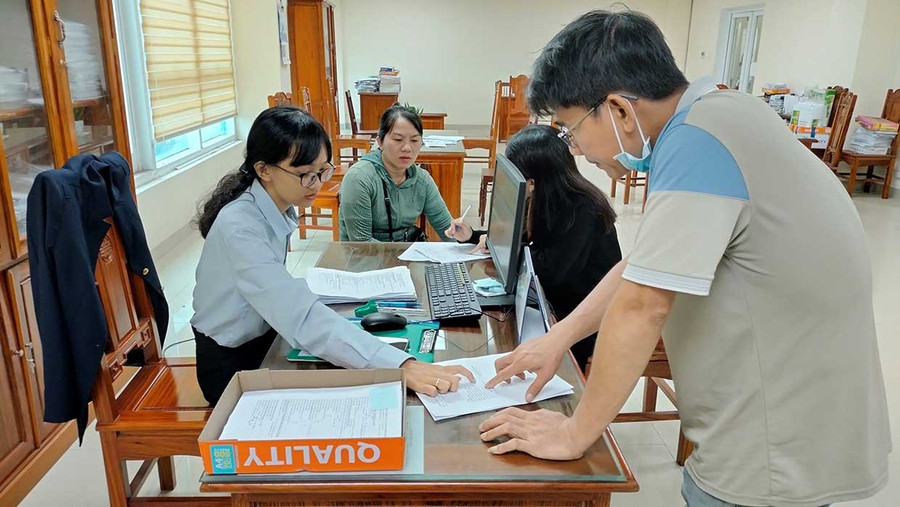
The K-factor is a risk warning indicator used by tax authorities in the management of electronic invoices (e-invoices). The K-factor is calculated using the formula: K = total value of goods sold / total value of inventory, plus total value of goods purchased. The risk warning threshold for manufacturing industries is K greater than 4 times, meaning the value of goods sold is more than 4 times the value of goods purchased plus the value of inventory. The risk warning threshold for the commercial sector is K greater than 2 times. Based on the calculation method and the aforementioned risk warning thresholds, tax authorities determine the correlation ratio between the total value of goods sold and the total value of inventory plus goods purchased by business households and enterprises.
“Every day, when sellers or service providers submit invoices to the tax authority’s electronic invoice system, the system automatically analyzes and evaluates them, immediately detecting abnormal K coefficients (too high or too low). This is a sign of fictitious invoice issuance or incomplete information declaration, posing many risks. At the same time, the system sends warnings to both the tax authority and the buyer, service provider, or goods supplier,” said Mr. Nguyen Duong Han, Deputy Head of Business Management and Support Department No. 1 (Provincial Tax Department).
Based on this, the tax authorities will verify the validity of the invoices, compare them with the business activities of the enterprise, determine the reasonableness of the inventory levels at the facility, and request an explanation from the enterprise. If the enterprise fails to provide an explanation, the tax authorities will conduct an on-site inspection to verify the inventory situation and compare it with the information on the invoices, in order to determine whether the enterprise issued invoices in accordance with regulations or whether it issued fictitious invoices. If the enterprise is found to have issued fictitious invoices or committed fraud, the tax authorities may temporarily suspend the use of electronic invoices by the relevant enterprise to prevent further violations.
In the first seven months of 2025, 2,781 cases of goods and services invoices receiving a K-factor warning were recorded in the province, of which 2,525 cases have been processed by the tax authorities. At the request of the provincial tax authorities, these cases promptly explained the reasons for the K-factor warning and provided additional relevant information to the tax authority's electronic invoice system. After the businesses supplemented the information, the tax authority's electronic invoice system no longer issued a risk warning.
Mr. Vu Hong Quan, Chairman of the Binh Dinh Young Entrepreneurs Association, said: "In the context of many individuals establishing 'ghost' businesses for the purpose of illegally buying and selling invoices to profit, the application of the K coefficient by the tax authorities will help businesses avoid risks, create a healthy investment and business environment, and ensure the rights of businesses that comply well with the law. Furthermore, the K coefficient is also a useful tool to help businesses self-manage risks, contributing to enhancing their reputation and competitiveness."

Several other businesses also argue that invoice violations not only cause financial losses but also affect the company's reputation. Therefore, businesses themselves must comply with tax laws, including proactively applying the K coefficient, viewing this as an important solution to minimize risks and build the company's image and reputation.
Regarding the tax authorities, Mr. Le Minh Nhut, Head of Gia Lai Provincial Tax Department, stated: Applying the K coefficient is one of the solutions contributing to the modernization of the tax sector, improving management efficiency and combating tax evasion. Therefore, the provincial tax authority will continue to maintain the K coefficient and strengthen measures to support businesses, helping them avoid unnecessary risks and violations, improve the efficiency of investment in production and business, increase revenue, and voluntarily fulfill their tax obligations.
Source: https://baogialai.com.vn/ap-dung-he-so-k-chong-that-thu-thue-nang-cao-nang-luc-canh-tranh-post567280.html
















































































![[Photo] Closing Ceremony of the 15th Conference of the Central Committee of the 13th Party Congress](https://vphoto.vietnam.vn/thumb/402x226/vietnam/resource/IMAGE/2025/12/23/1766462841764_a1-bnd-3731-1647-jpg.webp)

































Comment (0)